 Even before Hurricane Ian devastated the state, Florida's insurance industry was collapsing. As discussed on today's BradCast, decades of climate denialism by the Republicans who run the state hasn't helped. [Audio link to full show follows below this summary.]
Even before Hurricane Ian devastated the state, Florida's insurance industry was collapsing. As discussed on today's BradCast, decades of climate denialism by the Republicans who run the state hasn't helped. [Audio link to full show follows below this summary.]
Gov. Ron DeSantis seems to have a very different perspective on federal hurricane disaster aid than he did while a freshman in Congress in 2013, when he was an adamant "no" vote on sending federal aid dollars to New York and New Jersey after the devastation of Hurricane Sandy. He also seems to have a different opinion of President Biden than he did just a week or so ago, when the ambitious GOP Presidential hopeful was threatening to use state taxpayer dollars to fly undocumented immigrants to Biden's home in Delaware. Suddenly, the DeSantis swagger is gone. At least for now, as the Sunshine State Guv has little choice after Ian but to crawl hat in hand to the same federal government he has pretended to abhor for political benefit.
But that's not DeSantis' only problem. As our guest today, THOMAS FRANK, longtime climate change impact journalist at E&E News, explains, the insurance industry in Florida has been in big trouble for some time. Major insurers left the state after Hurricane Andrew in 1992, and six of the regional mom and pop outfits who took their place have gone insolvent over the past year alone.
"There's not the kind of robust, private sector [in the insurance industry] you have really everywhere else in the country," Frank tells me today. "What happened the last few days is going to make a bad situation --- pick your adjective --- horrendous. The truth is nobody knows exactly how bad it's going to be, because that's going to take weeks, months to figure out as people try to start filing claims and so forth. But I don't anyone thinks it's going to be anything but bad."
Frank has been reporting on --- and warning about --- the state's failing insurance industry long before Ian may have finished it off. Premiums for homeowners insurance cost about 3 times more than the national average and, at the same time, Florida's Citizens Property Insurance Corp., the state-backed insurer of last resort, has been under-pricing homeowner policies for years, he says. They are unlikely to have enough money to pay out the claims that will soon come flooding in.
Moreover, homeowner policies don't cover flood insurance. That's left to a federal government program and most Floridians who have flood coverage live on the coast, even as hundreds of thousands of homeowners who have been flooded out this week live nowhere near it. They are unlikely to be insured for flooding at all.
As Frank writes today at E&E, "Hurricane Ian is expect to financially ruin countless people" in the state, including both homeowners and insurers. As he wrote yesterday at Politico, "Profit drove a 30-year boom" in the state, particularly near the coast, where the population has doubled or tripled amid a building boom in recent years, despite warnings from climate experts about sea rise and the intensification of hurricanes. "Ian smashed" that boom "in a day," writes Frank.
This, in a state controlled by climate change denialist politicians who have gone so far as to ban the use of the phrase "climate change" in state reports, and where DeSantis, as recently as last month, began an effort to bar the state's pension fund from even considering environmental factors when investing billions of dollars belonging to teachers, firefighters and other state workers.
Please tune in for today's enlightening conversation.
Finally today, Democrats in the House Oversight Committee recently obtained and released a trove of internal documents from fossil fuel industry insiders from ExxonMobil, Chevron, Shell and BP. The communications reveal that Big Oil execs, staffers and lobbyists admit to "gaslighting" the public regarding their public claims to be fighting against the climate crisis. (Who could have guessed it?!) For example, while Shell has publicly claimed they are working toward "net-zero" greenhouse gas emissions by 2050, a missive to employees in 2020 instructs them to never "imply, suggest, or leave it open for possible misinterpretation that (net zero) is a Shell goal or target," adding that the company has "no immediate plans to move to a net-zero emissions portfolio" over the next 10 to 20 years.
Republicans on the House Committee are furious that their friends and campaign donors have been exposed (again) as liars. And the companies argue the Committee's selective release of documents doesn't offer a full picture of their very very concerned stance on the climate crisis. So, as a public service, we close today with a new ad from Chevron that may help clear the air a bit. You're welcome!
(Snail mail support to "Brad Friedman, 7095 Hollywood Blvd., #594 Los Angeles, CA 90028" always welcome too!)
|


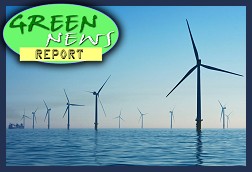 'Green News Report' 1/20/26
'Green News Report' 1/20/26
 Sunday 'Domestic Terrorist' Toons
Sunday 'Domestic Terrorist' Toons 'A Cornered Rat is a Dangerous Rat': Trump Terrorizes Minn., Menaces NATO, World: 'BradCast' 1/15/26
'A Cornered Rat is a Dangerous Rat': Trump Terrorizes Minn., Menaces NATO, World: 'BradCast' 1/15/26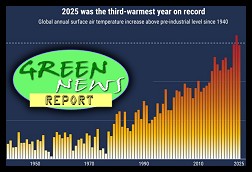 'Green News Report' 1/15/26
'Green News Report' 1/15/26 'This Isn't Close to Over': Mad King Trump in Venezuela (and Beyond): 'BradCast' 1/14
'This Isn't Close to Over': Mad King Trump in Venezuela (and Beyond): 'BradCast' 1/14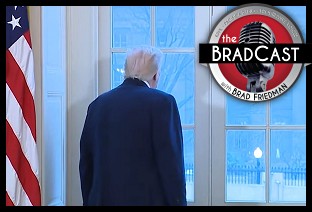 Things Getting Weirder as Trump Keeps Losing: 'BradCast' 1/13/26
Things Getting Weirder as Trump Keeps Losing: 'BradCast' 1/13/26 'Green News Report' 1/13/26
'Green News Report' 1/13/26 After ICE Murder in MN, Local Cops Disown Fed Policing Practices: 'BradCast' 1/12/26
After ICE Murder in MN, Local Cops Disown Fed Policing Practices: 'BradCast' 1/12/26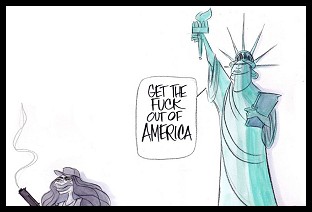 Sunday 'Ice Age' Toons
Sunday 'Ice Age' Toons 'Green News Report' 1/8/26
'Green News Report' 1/8/26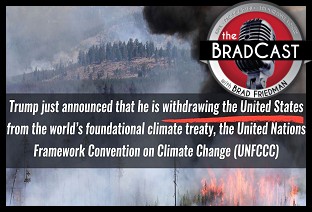 Trump to Congress, Climate, U.N., Rule of Law: DROP DEAD - 'BradCast' 1/8/26
Trump to Congress, Climate, U.N., Rule of Law: DROP DEAD - 'BradCast' 1/8/26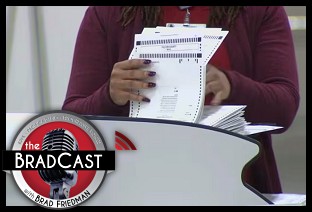 'Nonsense': Trumpers Claim 315k Fraudulent GA Votes in 2020: 'BradCast' 1/7/26
'Nonsense': Trumpers Claim 315k Fraudulent GA Votes in 2020: 'BradCast' 1/7/26 Jack Smith Testimony on Trump J6 Crimes, DOJ Weaponization: 'BradCast' 1/6/26
Jack Smith Testimony on Trump J6 Crimes, DOJ Weaponization: 'BradCast' 1/6/26 Trump War on Venez. is About Ego, Power, 'Alien Enemies Act': 'BradCast' 1/5/26
Trump War on Venez. is About Ego, Power, 'Alien Enemies Act': 'BradCast' 1/5/26 Have a Holly Jolly Somehow
Have a Holly Jolly Somehow Old Man Shouts at People from WH for 20 Minutes: 'BradCast' 12/18/25
Old Man Shouts at People from WH for 20 Minutes: 'BradCast' 12/18/25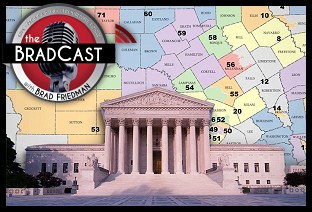 SCOTUS' How-To on Gerrymandering on 'Eve' of Election Year: BradCast' 12/17/25
SCOTUS' How-To on Gerrymandering on 'Eve' of Election Year: BradCast' 12/17/25 Bricks in the Wall: 'BradCast' 12/16/25
Bricks in the Wall: 'BradCast' 12/16/25
 VA GOP VOTER REG FRAUDSTER OFF HOOK
VA GOP VOTER REG FRAUDSTER OFF HOOK Criminal GOP Voter Registration Fraud Probe Expanding in VA
Criminal GOP Voter Registration Fraud Probe Expanding in VA DOJ PROBE SOUGHT AFTER VA ARREST
DOJ PROBE SOUGHT AFTER VA ARREST Arrest in VA: GOP Voter Reg Scandal Widens
Arrest in VA: GOP Voter Reg Scandal Widens ALL TOGETHER: ROVE, SPROUL, KOCHS, RNC
ALL TOGETHER: ROVE, SPROUL, KOCHS, RNC LATimes: RNC's 'Fired' Sproul Working for Repubs in 'as Many as 30 States'
LATimes: RNC's 'Fired' Sproul Working for Repubs in 'as Many as 30 States' 'Fired' Sproul Group 'Cloned', Still Working for Republicans in At Least 10 States
'Fired' Sproul Group 'Cloned', Still Working for Republicans in At Least 10 States FINALLY: FOX ON GOP REG FRAUD SCANDAL
FINALLY: FOX ON GOP REG FRAUD SCANDAL COLORADO FOLLOWS FLORIDA WITH GOP CRIMINAL INVESTIGATION
COLORADO FOLLOWS FLORIDA WITH GOP CRIMINAL INVESTIGATION CRIMINAL PROBE LAUNCHED INTO GOP VOTER REGISTRATION FRAUD SCANDAL IN FL
CRIMINAL PROBE LAUNCHED INTO GOP VOTER REGISTRATION FRAUD SCANDAL IN FL Brad Breaks PA Photo ID & GOP Registration Fraud Scandal News on Hartmann TV
Brad Breaks PA Photo ID & GOP Registration Fraud Scandal News on Hartmann TV  CAUGHT ON TAPE: COORDINATED NATIONWIDE GOP VOTER REG SCAM
CAUGHT ON TAPE: COORDINATED NATIONWIDE GOP VOTER REG SCAM CRIMINAL ELECTION FRAUD COMPLAINT FILED AGAINST GOP 'FRAUD' FIRM
CRIMINAL ELECTION FRAUD COMPLAINT FILED AGAINST GOP 'FRAUD' FIRM RICK SCOTT GETS ROLLED IN GOP REGISTRATION FRAUD SCANDAL
RICK SCOTT GETS ROLLED IN GOP REGISTRATION FRAUD SCANDAL VIDEO: Brad Breaks GOP Reg Fraud Scandal on Hartmann TV
VIDEO: Brad Breaks GOP Reg Fraud Scandal on Hartmann TV RNC FIRES NATIONAL VOTER REGISTRATION FIRM FOR FRAUD
RNC FIRES NATIONAL VOTER REGISTRATION FIRM FOR FRAUD EXCLUSIVE: Intvw w/ FL Official Who First Discovered GOP Reg Fraud
EXCLUSIVE: Intvw w/ FL Official Who First Discovered GOP Reg Fraud GOP REGISTRATION FRAUD FOUND IN FL
GOP REGISTRATION FRAUD FOUND IN FL

































